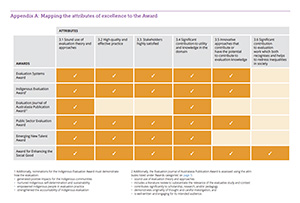The Awards are assessed using four criteria:
- Professionalism
- Ethical conduct
- Excellence of the evaluation work
- Award specific sub-criteria
The first two criteria – professionalism and ethical conduct – mainly apply to the role of the evaluator and/or the evaluation team and must be clearly demonstrated. The principle of excellence and award specific sub-criteria are mainly concerned with evaluation practice, theory and products. Excellence is assessed on a scale against the attributes relevant to the category of Award. Award specific sub-criteria apply to the Indigenous Evaluation Award and the Evaluation Journal of Australasia Publications Award.
1. Professionalism
The evaluation team/person demonstrates high professional standards in both evaluation and relevant domains, especially in dealing with challenges presented in their work. Nominations should reference statements of applicable professional standards from relevant professional bodies, where appropriate.
2. Ethical conduct
The evaluation team/person demonstrates high standards of ethical conduct, including adherence to the AES Code of Ethics and AES Guidelines for the Ethical Conduct of Evaluations. In particular, nominations will demonstrate, where appropriate, an understanding of the special ethical considerations involved in evaluation work with Indigenous people, and the vulnerability or disempowerment of people in dependent or unequal relationships.
3. Excellence of the evaluation work
The evaluation work (or person) should demonstrate attributes of excellence in ways relevant to the Award category (see descriptions for each Award above):
3.1. Sound use of evaluation theory and approaches
3.2. High quality and effective practice in consultation, design, planning, data collection, analysis and reporting
3.3. Stakeholders highly satisfied with the evaluation work and its use or impact
3.4. Significant contribution to utility and knowledge in the domain in which the evaluation is conducted
3.5. Innovative approaches that contribute to, or that have the potential to contribute to evaluation knowledge and practice
3.6. Significant contribution to evaluation work which both recognises and helps to redress inequalities in society.
The attributes of excellence apply to the Award categories as outlined in the list below:
- Evaluation Systems Award – Attributes 3.1, 3.2, 3.3, 3.4 and 3.5
- Indigenous Evaluation Award – Attributes 3.1, 3.2, 3.3, 3.4 and 3.5
- Evaluation Journal of Australasia Publication Award – Attributes 3.1, 3.4 and those listed in the Awards description in the 'Award categories' section.
- Public Sector Evaluation Award – Attributes 3.1, 3.2, 3.3, 3.4 and 3.5
- Emerging New Talent Award – Attributes 3.1, 3.2, 3.3 and 3.4
- Award for Enhancing the Social Good – Attributes 3.1, 3.2, 3.3, 3.4, 3.5 and 3.6
- Alternatively, download this illustrative matrix.
click image to enlarge
4. Award specific sub-criteria
The Indigenous Evaluation Award and the Evaluation Journal of Australasia Publications Award are assessed using a set of specific sub-criteria.
Nominations for the Indigenous Evaluation Award must demonstrate how the evaluation:
- generated positive impacts for the Indigenous communities
- nurtured Indigenous self-determination and sustainability
- empowered Indigenous people in evaluation practice
- strengthened the accountability of Indigenous evaluation
Nominations for the Evaluation Journal of Australasia will be assessed against the extent to which the publication contains the following attributes:
- sound use of evaluation theory and approaches
- includes a literature review to substantiate the relevance of the evaluative study and context
- contributes significantly to scholarship, research, and/or pedagogy
- demonstrates originality of thought and careful investigation
- is well written and engaging for its intended audience
Assessment process
- Assessors are provided with a summary of nominations and are required to declare any potential conflict of interest. If a conflict of interest is declared, the assessor will not be involved in any deliberations or adjudication relating to that nomination.
- Each nomination is reviewed by at least two assessors, based on their experience/skills.
- In the event that the selected assessors are unable to agree on the relative merit of a nomination, an additional assessor reviews the nomination before a final decision is made.
- In the event that no nominations in an Award category meet the required standard, no Award will be given in that category.
- Formal commendations are not given but good practices that do not receive an award are recognised during the awards ceremony.
- Recommendations are submitted to the AES Board for approval.
- The Board’s decisions will be communicated to Award recipients prior to formal announcement of the Awards each year.
- Nominations receive feedback from the assessors, regardless of the outcome for continuous learning.

